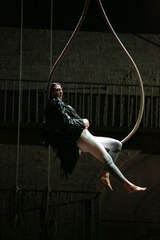| Opera Reviews | 27 April 2024 |
Ovations for an acrobatic thieving magpieby Silvia Luraghi |
|
| Rossini: La gazza ladra Teatro alla Scala, Milan 22 April 2017 |
|
|
The opera, which premiered in Milan in 1817, enjoyed great success and remained as a regular feature of the following seasons at La Scala until 1841. It still enjoyed success elsewhere until the end of the 19th century, when it disappeared from the repertoire and was long forgotten; only its famous overture is world renowned and remains among frequent features of symphonic concerts. As for many other obscure Rossini works, its revival in recent years has been undertaken by Pesaro’s Rossini Opera Festival. The libretto by Giovanni Gherardini consists of two acts, in which frequent thefts of silverware by a magpie give a hard time to Ninetta, the servant of a rich and liberal family. The girl, who is trying to help her father wrongly accused of desertion, is coveted by the local governor Gottardo. Taking advantage of the situation he brings her to jail, but once the nest of the magpie is discovered by a friend of Ninetta, she can join again her beloved Giannetto, her master’s son. The plot develops in over three hours of music, and needs the support of a skilled stage director to capture the audience's attention. Salvatores, making his debut here as an opera director, animated the stage by giving a prominent role to the magpie, acrobat Francesca Alberti, who crossed the stage on a suspended rope during the whole performance. This was the most noticeable feature of the production, which featured quite traditional sets and costumes (by Gian Maurizio Fercioni), setting the action generically in what one would expect to be a country house in Rossini’s time. Among the principals are three basses, Gottardo, Ninetta’s father Fernando Villabella, and her master Fabrizio Vingradito. The roles were covered by three outstanding interpreters: Michele Pertusi, Alex Esposito and Paolo Bordogna respectively. Pertusi, who has a repertoire in which Rossini’s operas have always played an important role, was a slimy, yet authoritative Gottardo. Esposito touchingly delivered the role of Fernando, while Bordogna showed his skills as a sympathetic Fabrizio. Soprano Rosa Feola was a cunning yet sweet Ninetta, with a nice light and well supported voice, while tenor Edgardo Rocha was a somewhat nosy Giannetto. Maestro Riccardo Chailly had prepared with great care for the new production, working with the singers and the stage director. The orchestra followed him with a compact sound, in perfect combination with the stage. On opening night, conspicuous expressions of disagreement were addressed especially toward the conductor: reportedly, a group of loggionisti came to the performance especially prepared to boo, but were then opposed by a group of supporters, and the two groups offered an unexpected post-performance show. From the second performance onward there was only applause for all the singers and for the conductor, with a large ovation for the acrobatic magpie.
|
|
| Text ©
Silvia Luraghi Photo © Brescia & Amisano / Teatro alla Scala |

 After 176 years’ absence, Gioacchino Rossini’s opera semiseria La gazza ladra (The thieving magpie) returned to La Scala in a new production directed by Academy Award winner Gabriele Salvatores.
After 176 years’ absence, Gioacchino Rossini’s opera semiseria La gazza ladra (The thieving magpie) returned to La Scala in a new production directed by Academy Award winner Gabriele Salvatores. 





